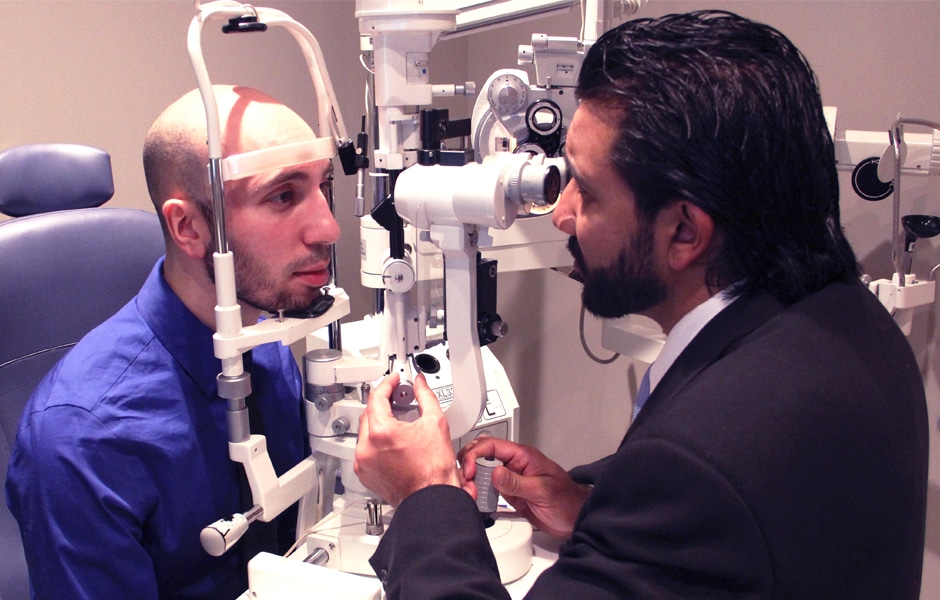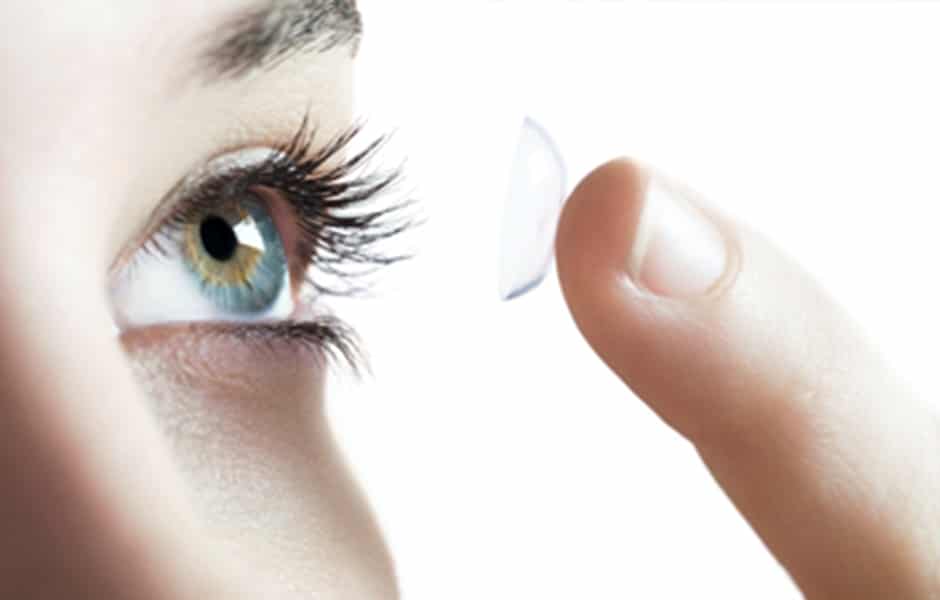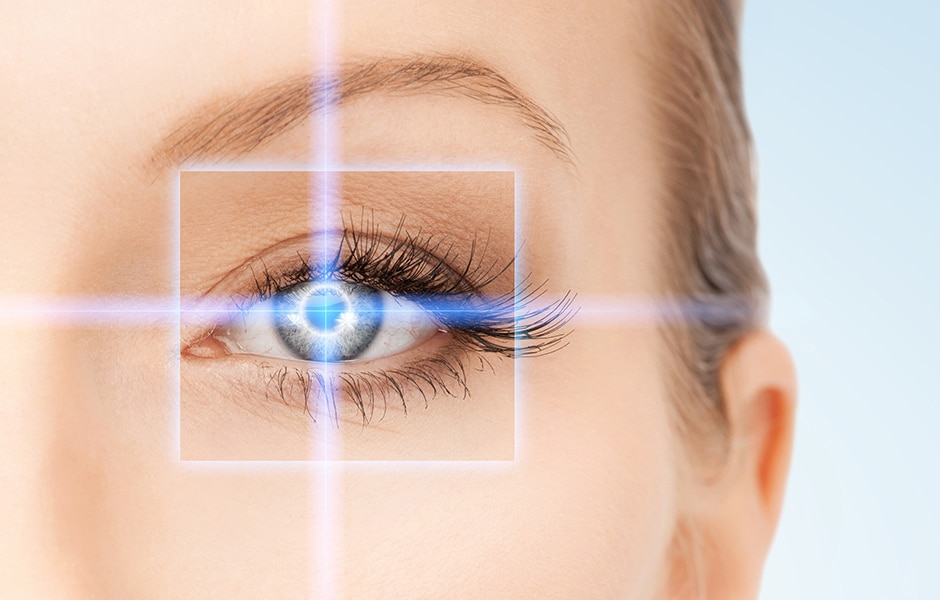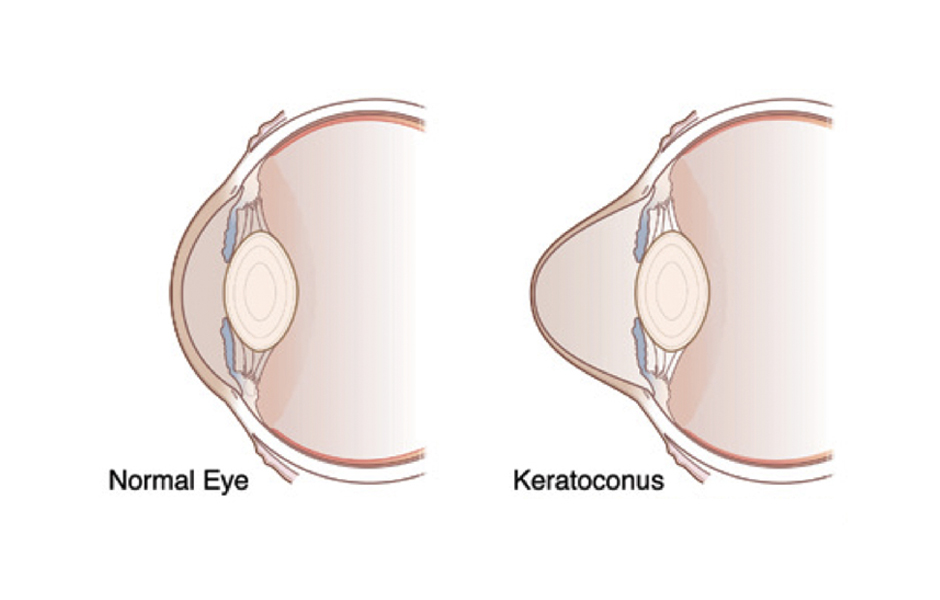We Are Here To Serve Your Eye Care needs in Chicago
At Village Eyecare, you will receive the highest quality eye care services from a Chicago eye doctor who cares about each member of your family. Whether you’re scheduling an appointment for a yearly eye examination or you have a specific health concern, our team of qualified professionals will help you maintain and improve your vision and eye health. Your optometrist will do a thorough eye exam and watch for signs of potential eye problems. We use advanced examination technology and digital measurement to enable accurate diagnosis, precision of fit and comfort in eyewear, and personalization of eye care and experience.
Read more information about the Chicago eye care we provide below:
Why Are We The Best?
Quality eyewear and service is our utmost concern. For this reason, we have installed our own lens finishing lab within our office. Having an on-site lab enables us to manufacture your lenses to the exact specifications of your prescription.
The on-site lab allows us to produce most single vision prescriptions within the same day, depending on tint or coating options. No more waiting for the lab to send your glasses, because your glasses will be ready to wear right away! Progressive lenses are custom ordered and will be typically completed in our lab in 1 or 2 days. In some cases next day service is available.
We use the latest diagnostic equipment in our Chicago optometry office. This technology allows us to detect eye problems sooner, resulting in more effective treatments. These are some of the tools that we use:
- Equipment and Advanced Testing
- Corneal Topographer
- Dry Eye Analyzer
- Visual Field
- Anterior Segment Camera
- Retinal Fundus Camera
- Digital Refraction Systems
- Electronic Medical Records
- OCT (Optical Coherence Tomography)
- Patient Education Videos
At Village Eyecare, we are equipped to deal with eye emergencies and can make sure you receive the best possible care when you need it the most. We understand the importance of immediate eye care if you have symptoms of sudden vision loss, pain, light sensitivity, discharge, redness, flashes of light, or floaters. These are signs that it is necessary to have an immediate consultation.
Please call one of our Chicago offices right away if you need urgent care, and follow prompts for after hours calls:
- University Village: 312.829.6173
- South Loop: 312.663.4250
- Hyde Park: 773.363.0202
- Wicker Park: 773.697.7370
- Conjunctivitis (bacterial, viral, allergic)
- Corneal Ulcers
- Corneal Abrasions
- Foreign Body Removal
- Iritis
- Keratoconus
- Dry Eye Syndrome
- Blepharitis
- Meimbomian Gland Dysfunction
- Glaucoma
- Diabetic Retinopathy
- Hypertensive Retinopathy
- Cataracts
- Macular Degeneration
- Retinal Tears and Detachments
- Posterior Vitreal Detachment
For more information on eye conditions click here

Eye Examinations
Eye examinations are performed to evaluate all aspects of your vision and a proper eye exam should be performed by Board Certified Eye Care Professional. Read More >>
Eye Examinations
Eye examinations are essential for optimal eye health, and are performed to evaluate all aspects of your vision. An eye examination is more than checking for impaired vision, your eye doctor will also check to see if you have any signs of eye disease or if there are any other problems that could lead to future loss of vision. Regular eye exams are a preventive practice that should be taken as seriously as other routine, annual exams.
Whatever your age, no matter how strong your eyesight is, one of the best things you can do for your eyes is maintain regularly scheduled eye examinations with an experienced optometrist.
Caring for your eyesight begins with complete eye examinations. Complete eye exams are about more than just testing your vision, it’s a full check-up for your eyes. Many eye care problems can develop over long periods of time, without symptoms, and can irreversibly damage your vision. Regularly scheduled eye exams are the best way to detect such conditions early, and address them before they develop into more serious problems. Most adults should have a eye exam every one to two years. Children should receive an eye exam regularly as they grow to detect and treat eye conditions that can affect their progress in school. Infants should have their first comprehensive eye exam at six months, and subsequent exams as directed by their eye doctor. Patients who are at a higher risk for certain conditions, such as diabetes, a family history of glaucoma, and those over the age of 40, should have exams more frequently, as recommended by their eye doctor. Remember that caring for your eyesight begins with eye examinations. They are the best way to detect eye conditions early, and address them before they develop into more severe problems.

Contact Lens Fittings
Contacts can improve your vison and eye health, whether you need them for sports, work, or just occasionally, we can choose the best lens for your eyes. Read More >>
Contact Lens Fittings
Village Eyecare optometrists prescribe contact lenses to correct myopia (nearsightedness), hyperopia (farsightedness), astigmatism and presbyopia (difficulty focusing at near).
Our experienced eye doctors provide patients with the best fitting contact lens based on the physiology of their eye, visual demands, and lifestyle. Prior to fitting a contact lens, a scan of the cornea (topography) and an analysis of the moisture levels of the eye will be performed. Each patient is provided with a customized contact lens that optimizes vision and is comfortable for maximum eye health.
In addition, Village Eyecare optometrists provide fittings and care for specialty custom contact lenses:
- Custom contact lenses for corneal diseases and complex conditions, such as Keratoconus, Corneal Ectasia, Post-Surgical, and Traumatic Injury
- Specialty Contact Lenses, including astigmatism, daily disposable, multifocal, and cosmetic color lenses. Multiple lens materials such as soft hydrogelt lenses, gas permeable lenses, sclera and cornea-scleral lenses, and hybrid lenses (gas-permeable center with soft lens skirt)
- Training in proper Lens Insertion, Lens Removal, and Lens Care
What should I bring to the appointment?
If new to Village Eyecare, please bring a copy of your last contact lens prescription or your current boxes of contact lenses. In addition, bring your current glasses as a new eyeglass prescription will be determined during the comprehensive exam.

Dry Eye Treatment
When your eyes aren’t providing enough moisture, it can result in pain, itching, redness, a sensitivity to light, or even blurred vision, visit your eye doctor and get proper treatment today. Read More >>
Dry Eye Treatment
For optimal eye health, it is important that your eyes continue to produce tears to maintain the right levels of lubrication and moisture. If your eyes aren’t providing enough moisture, then it can result in pain, itching, redness, a sensitivity to light, or even blurred vision.
During your eye examination, your eye doctor will help you to determine if you are suffering from symptoms of dry eyes. You might be surprised that you have dry eyes, because sometimes the symptoms aren’t what you would expect. For example, you might have excess tears running down your face throughout the day, which is actually a sign of dry eyes because your tear ducts are producing more lubrication which is overcompensating for the dry eye problem.
Your optometrist can help you to determine the best dry eye treatment, which might include things such as eye drops or ointments. Sometimes, other treatments might be needed, such as a temporary punctal occlusion, or non-dissolving punctal plugs.
Dry eyes are uncomfortable, and can be caused by many different things. Certain lifestyle factors may impact your risk factor for dry eyes, and talking with a Chicago eye doctor can help you to identify steps that can be taken to reduce the dryness in your eyes.
Risk factors for dry eyes include:
- Medications: Using certain types of medications may cause your eyes to dry out. These medications may include things such as birth control, antihistamines, anti-depressants, nasal decongestants, blood pressure medications, and tranquilizers.
- Infrequent Blinking: Some activities may decrease the frequency of blinking, which can lead to dry eyes. These activities include things such as using the computer, playing video games, or looking at a screen for too long.
- Autoimmune Disorders: Certain autoimmune diseases may increase a person’s risk for dry eyes. Examples of these autoimmune disorders include lupus, rheumatoid arthritis, and Sjogren’s syndrome.
- Eye Inflammation: Chronic eye inflammation may lead to dry eyes. The inflammation can occur from things such as tobacco smoke exposure, infection, eye diseases, chemical exposure, or drafts from indoor HVAC systems.
- Age: Older people are more likely to have dry eye problems, although dry eyes can occur to people of any age. Women have a higher risk for dry eye problems after menopause.
- Other Dry Eye Risk Factors: There are a few other things that might increase your risk for dry eyes, including allergies, homeopathic remedies, excessive vitamin dosages, thyroid disease, eye surgery (such as LASIK), skin diseases near the eye, pregnancy, and glandular diseases.
Eyes should produce tears in order to keep your eye moist and comfortable. If you find that the tears are not consistent enough and result in dry eyes, then you should talk with your Chicago optometrist about options that are available for dry eyes.

Laser Vision Correction
If your considering laser vision correction it is important to understand how it works, the possible risks and if you are a good candidate for the surgery. Read More >>
Laser Vision Correction
The most common laser vision correction procedures are done with an excimer laser. The excimer laser is a computer-guided cool laser that corrects vision by reshaping the cornea to improve the way light is focused or refracted by the eye. Two major procedure types are available for treating low to moderate levels of nearsightedness, farsightedness and astigmatism: Laser Assisted In-Situ Keratomileusis (LASIK) and surface ablation, including Photorefractive Keratectomy (PRK) or LASEK (a variation on PRK). In all of these procedures, the laser sculpts the cornea in about 30 to 60 seconds and the entire procedure takes approximately 15 minutes from start to finish.
Laser Assisted In-Situ Keratomileusis (LASIK)
After a drop of anesthetic is applied to the eye, an instrument called a microkeratome glides across the cornea and creates a corneal flap. The surgeon carefully lifts the flap, and in 30 to 60 seconds, ultraviolet high-energy pulses from the excimer laser reshape the internal cornea layers. By adjusting the pattern of the laser beam, the surgeon can treat high levels of nearsightedness and moderate amounts of farsightedness and astigmatism.
After the cornea has been reshaped, the flap is gently replaced in its original position. Because of the cornea’s natural bonding qualities, healing is rapid and does not require stitches. Some patients report a slight postoperative discomfort that is usually alleviated with eye drops. Many patients see a dramatic improvement in their vision within a day. For others, vision may fluctuate and continue to improve for several weeks.
For someone who has presbyopia, monovision reduces your dependence on distance glasses and near glasses. While you may be able to read a dinner menu, labels and price tags, you may still need reading glasses for fine print and prolonged reading. Sometimes distance glasses may be required for night driving. People who have successfully simulated monovision through contact lenses may want to consider the option of monovision for laser refractive surgery.
Laser Vision Correction & Presbyopia
Once in our 40’s and beyond, most of us need reading glasses or bifocals to read smaller print. This condition is called presbyopia and it is caused by changes that occur in the lens inside the eye. Refractive surgery cannot correct presbyopia because refractive procedures alter the shape of the cornea, without changing the lens inside the eye. Symptoms of presbyopia can often be reduced with mono vision.
For someone who has presbyopia, monovision reduces your dependence on distance glasses and near glasses. While you may be able to read a dinner menu, labels and price tags, you may still need reading glasses for fine print and prolonged reading. Sometimes distance glasses may be required for night driving. People who have successfully simulated monovision through contact lenses may want to consider the option of monovision for laser refractive surgery.
Customized Laser Vision Correction
Wavefront is an advanced diagnostic technology for laser vision correction and that creates a precise map of your eye, like a blue print. This map enables refractive surgeons to customize your laser vision correction treatment in ways they could not before. For a number of years, laser vision correction could not address more complex visual imperfections that can make even 20/20 vision seem less sharp, such as night glare and halos.
Wavefront technology identifies these highly complex imperfections by projecting light waves into your eye and mapping the waves that bounce back. That map is transmitted to the surgeon’s laser. The surgeon then uses the map to reshape your cornea in a more customized manner, maintaining the best quality of vision in dim lighting, as well as reducing the incidence of halos and glare.
IntraLase
With the IntraLase Femtosecond (FS) Laser, the surgeon can now use tiny beams of laser light which for appropriate candidates can enhance the safety and accuracy of your procedure. This allows the surgeon to perform “all laser LASIK,” using 2 different lasers for the 2 steps of the procedure: the femtosecond laser to make the flap, and the excimer laser to contour the cornea’s curvature, adjusting its focusing power. The process can be up to 100 times more accurate, results in fewer complications and allows patients a higher degree of comfort.
IntraLase allows us yet another degree of accuracy and safety. Because of its accuracy, it allows us to treat a broader range of people including those who, because of the thickness of their corneas, weren’t good candidates for the traditional LASIK procedure.
Am I A Candidate?
One of our experienced optometrists will give you a comprehensive eye exam to determine if you are a good candidate for LASIK eye surgery or other vision correction services.
To be eligible for surgery, you must:
- at least 18 years of age
- Have stable vision for at least one year prior to surgery
- Have healthy eyes that are free of disease, scars, or optic nerve problems, retinal disorders and corneal abnormalities
- Be well informed about the procedure and have realistic expectations of the outcome
- Have good general health
- Have no auto-immune systemic diseases
- Have adequate tear film
- Not be nursing or pregnant
As is true of any medical procedure, laser vision correction involves risks. It is important that you understand the risks of this procedure before deciding if it is right for you. Some of the potential risks include:
Night Glare — With present technology, most laser vision correction patients do not experience significant worsening of night vision or night glare. But, some patients may experience halos or star bursting following their procedure, especially if these are currently experienced with contact lens or glasses wear.
Dryness & Fluctuating Vision — After LASIK, your eyes often feel dry during the first month after surgery. These symptoms are usually relieved with the use of artificial tears. If you have a pre-existing dry eye condition, please discuss this with your refractive surgeon, as the symptoms may be more pronounced after the surgery. Generally, this resolves after a few months, as the cornea fully recuperates from the surgery.
Infection and Corneal Flap Risks — The risk of eye infection is the greatest immediately following the procedure. Antibiotic drops help to minimize infection. Some patients may also develop problems following the LASIK procedure as the flap heals.
Please discuss all the benefits and potential risks with your doctor. It is essential that you are well informed and have realistic expectations before proceeding with laser vision correction.

Keratoconus Care
Early detection through regular eye exams is the best way to prevent major vision loss, keratoconus treatments might be able to slow the progress of the eye disease. Read More >>
Keratoconus Care
Another potential eye disease that your doctor might identify during your examination is keratoconus, which is a condition where the cornea becomes so weak that it is unable to hold the proper shape for your eye. Typically, the cornea maintains a dome shape, but when it weakens it might begin to bulge and form more of a cone shape.
The problem with this change in shape within the cornea is the fact that it can lead to vision loss. Early detection through regular eye exams is the best way to prevent major vision loss in the future, because certain keratoconus treatments might be able to slow the progress of the eye disease.
If your eye doctor in Hyde Park, Chicago sees that you have early signs of keratoconus, then the doctor will suggest specific treatments that will help your to maintain good eye health. In severe cases, a corneal transplant might be needed, which is why it is important to visit your eye doctor regularly in order to detect the disease before it turns severe.

Diabetes Management
We can help you to effectively manage your diabetes, and avoid some of the common complications that could potentially lead to vision loss and blindness. Read More >>
Diabetes Management
If you have diabetes, then it is important to work closely with your eye doctor in order to determine the right treatment to manage your eye health. Diabetes increases your risk of vision loss, which could potentially lead to blindness if it is left untreated. A qualified optometrist can help you to effectively manage your diabetes, and avoid some of the common complications.
Diabetes may increase your risk of glaucoma, cataracts, and diabetic retinopathy. The best option is to control your blood sugar levels in order to prevent these eye conditions from occurring. You can talk with your optometrist and your diabetes doctor in order to find the right approach with nutrition and medication. With the proper treatment, it is possible to manage your blood sugar levels and prevent vision loss.
In some situations, the diabetes may have already caused damage to your eyes. You should visit your eye doctor regularly to monitor the damage and find treatments that can help to slow the eye disease and prevent vision loss in the future.


